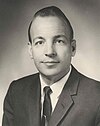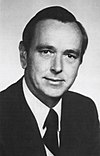New South governor is a term applied to various governors who led states in the Southern United States in the latter half of the twentieth century. Politically moderate, these governors were viewed as broadly progressive, avoiding racial rhetoric and advocating reform of government institutions.
History
In the early twentieth century, the Southern United States was characterized by Jim Crow racial segregation, widespread voter disenfranchisement, malapportionment of state legislative districts, and dominance by a single political party. At this time, governors' offices in the South were generally weak, and officeholders tended to be either political elites or adventurers. The United States Supreme Court's ruling in the 1954 case Brown v. Board of Education, the increased activity of the civil rights movement, and the creation of civil rights legislation altered these political dynamics. The passage of the Voting Rights Act in 1965 enabled the massive growth of black voter registration and black political participation. As a result, black voters began to combine their electoral strength with white moderates to alter the outcomes of regional elections.
New South governors tended to avoid race-baiting campaigning or strong affirmations in favor of segregation. Their campaigns were also more modernized and media driven, and they tended to rely upon coalitions of moderate and liberal white voters and blacks. Terry Sanford was the first New South governor, being elected Governor of North Carolina in 1960. He emphasized peaceful race relations, improvements in education, and vigorous economic development. Carl Sanders of Georgia was elected in 1962. Several New South governors were elected in 1970: Reubin Askew in Florida, John C. West in South Carolina, Dale Bumpers in Arkansas, and Jimmy Carter in Georgia. Many national media outlets celebrated the election of these politicians as a sign of change and social progress in the region. Bumpers described these electoral outcomes as "a cry for new leadership in the South". All declared upon their inaugurations that they would avoid racial issues of the past, and in office they tended to ignore racially-charged issues, careful not to alienate white voters. Bill Waller won election in Mississippi in 1971, and was succeeded in 1975 by Cliff Finch, who was described by The New York Times as emblematic of the New South.
By 1972, all Southern states except Alabama had elected a governor who espoused racially moderate rhetoric. Albert Brewer assumed the office of governor in Alabama in 1968 but was not elected, and was defeated in an electoral campaign for a full term in 1970. The victor, George Wallace, ran a racially-charged campaign but won the primary runoff by a narrow margin and moderated his stance after taking office.
A second group of New South governors were later elected, including Richard Riley of South Carolina, Bob Graham of Florida, George Busbee of Georgia, David Treen of Louisiana, William F. Winter of Mississippi, Lamar Alexander of Tennessee, Chuck Robb of Virginia, David Pryor and Bill Clinton of Arkansas, and James Holshouser, Jim Hunt, and James G. Martin of North Carolina. Many of these governors cited Sanford as an inspiration. Some of these governors sought national political influence, and two were elected President of the United States: Carter in 1976, and Clinton in 1992. Most New South governors were replaced by more conservative officeholders in the 1980s and 1990s.
While most New South governors were Democrats, as the Democratic Party had a strong hold on the south from the Civil War until the late 20th century, a handful of New South governors were Republicans. James Holshouser was the first Republican North Carolina governor in 76 years, and Dave Treen was the first Republican Louisiana governor in over 100.
Ideology and characteristics
New South governors tended to be well-educated, sometimes having been educated outside of the South. In office, they were active executives and proponents of government reform, emphasizing executive leadership, efficiency, and honesty. Some supported new government services, but typically avoided large tax increases. The extent of reform they supported was generally limited to education, mental health services, and prisons. Most favored public investment in infrastructure, but not redistributionist programs. Many were economically conservative. New South governors also avoided racial rhetoric and took a moderate approach towards racial issues. These positions were guided by a desire to attract outside investment and strengthen professional workforces. They also tried to cultivate better relationships with the federal government than their predecessors, who had been more focused on states' rights.
New South governors
Ascended to office through death or resignation of incumbent governor
| Governor | Party | State | Term | Notes | ||||
|---|---|---|---|---|---|---|---|---|
| Start | End | Length of service | ||||||

|
Terry Sanford | Democratic | North Carolina | January 5, 1961 | January 8, 1965 | 4 years, 3 days | Later served as U.S. Senator from 1986 to 1993. | |

|
Carl Sanders | Democratic | Georgia | January 14, 1963 | January 10, 1967 | 3 years, 361 days | ||

|
Albert Brewer | Democratic | Alabama | May 7, 1968 | January 18, 1971 | 2 years, 256 days | ||

|
Reubin Askew | Democratic | Florida | January 5, 1971 | January 2, 1979 | 7 years, 362 days | ||

|
Dale Bumpers | Democratic | Arkansas | January 12, 1971 | January 3, 1975 | 3 years, 356 days | Later served as U.S. Senator from 1975 to 1999. | |

|
Jimmy Carter | Democratic | Georgia | January 12, 1971 | January 14, 1975 | 4 years, 2 days | Later served as President of the United States from 1977 to 1981. | |

|
John C. West | Democratic | South Carolina | January 19, 1971 | January 21, 1975 | 4 years, 2 days | ||

|
Bill Waller | Democratic | Mississippi | January 18, 1972 | January 20, 1976 | 4 years, 2 days | ||

|
James Holshouser | Republican | North Carolina | January 5, 1973 | January 8, 1977 | 4 years, 3 days | ||

|
David Pryor | Democratic | Arkansas | January 14, 1975 | January 3, 1979 | 3 years, 354 days | Later served as U.S. Senator from 1979 to 1997. | |

|
George Busbee | Democratic | Georgia | January 14, 1975 | January 11, 1983 | 7 years, 362 days | ||

|
Cliff Finch | Democratic | Mississippi | January 20, 1976 | January 22, 1980 | 4 years, 2 days | ||

|
Jim Hunt | Democratic | North Carolina | January 8, 1977 January 9, 1993 |
January 5, 1985 January 6, 2001 |
15 years, 364 days | ||

|
Bob Graham | Democratic | Florida | January 2, 1979 | January 3, 1987 | 8 years, 1 day | Later served as U.S. Senator from 1987 to 2005. | |

|
Bill Clinton | Democratic | Arkansas | January 9, 1979 January 11, 1983 |
January 19, 1981 December 22, 1992 |
11 years, 356 days | Later served as U.S. President from 1993 to 2001. | |

|
Richard Riley | Democratic | South Carolina | January 10, 1979 | January 14, 1987 | 8 years, 4 days | ||

|
Lamar Alexander | Republican | Tennessee | January 20, 1979 | January 17, 1987 | 7 years, 362 days | Later served as U.S. Senator from 2003 to 2021. | |

|
William F. Winter | Democratic | Mississippi | January 22, 1980 | January 10, 1984 | 3 years, 353 days | ||

|
Dave Treen | Republican | Louisiana | March 10, 1980 | March 12, 1984 | 4 years, 2 days | ||

|
Chuck Robb | Democratic | Virginia | January 16, 1982 | January 18, 1986 | 4 years, 2 days | Later served as U.S. Senator from 1989 to 2001. | |

|
James G. Martin | Republican | North Carolina | January 5, 1985 | January 9, 1993 | 8 years, 4 days | ||
References
- ^ Harvey, Gordon E. (2014). "New South Governors". Law and Politics. The New Encyclopedia of Southern Culture. Vol. 10. UNC Press Books. pp. 374–375. ISBN 9781469616742.
- ^ Wirt 1997, p. 26.
- Sanders 2007, pp. 8–9.
- Sanders 2007, p. 3.
- Harvey 2002, p. 3.
- ^ Drescher 2000, p. xvii.
- ^ Evans 1993, p. 144.
- ^ Drescher 2000, p. xx.
- Cook, James F. (September 12, 2002). "Carl Sanders (b. 1925)". The New Georgia Encyclopedia. Georgia Humanities Council. Archived from the original on September 25, 2012. Retrieved April 4, 2024.
- Sanders 2007, p. 5.
- Sanders 2007, pp. 6, 174.
- ^ Dickenson, James R. (August 4, 1987). "Mississippi Governor's Contest Draws Record Field". The Washington Post. Retrieved June 24, 2022.
- ^ Reed, Roy (January 21, 1976). "A New, Biracial Political Course Found in Mississippi". The New York Times. Retrieved April 8, 2024.
- Sanders 2007, pp. 4–5.
- ^ Gretlund 1999, p. 28.
- "North Carolina". National Governors Association. Retrieved 2024-04-05.
- "Louisiana". National Governors Association. Retrieved 2024-04-05.
Works cited
- Drescher, John (2000). Triumph of Good Will: How Terry Sanford Beat a Champion of Segregation in and Reshaped the South. Jackson: University Press of Mississippi. ISBN 1-57806-310-8. - Read online, registration required.
- Evans, Eli N. (1993). The Lonely Days Were Sundays. University of Mississippi Press. ISBN 9781617035036.
- Gretlund, Jan Nordby, ed. (1999). The Southern State of Mind. University of South Carolina Press. ISBN 9781570033124. - Link to profile at Google Books
- Harvey, Gordon E. (2002). A Question of Justice: New South Governors and Education, 1968-1976. Tuscaloosa: The University of Alabama Press. ISBN 9780817311575.
- Sanders, Randy (2007). Mighty Peculiar Elections: The New South Gubernatorial Campaigns of 1970 and the Changing Politics of Race (reprint ed.). Louisiana State University Press. ISBN 9780807132906.
- Wirt, Frederick M. (1997). We Ain't what We was: Civil Rights in the New South. Duke University Press. ISBN 9780822318934. - Profile at Google Books